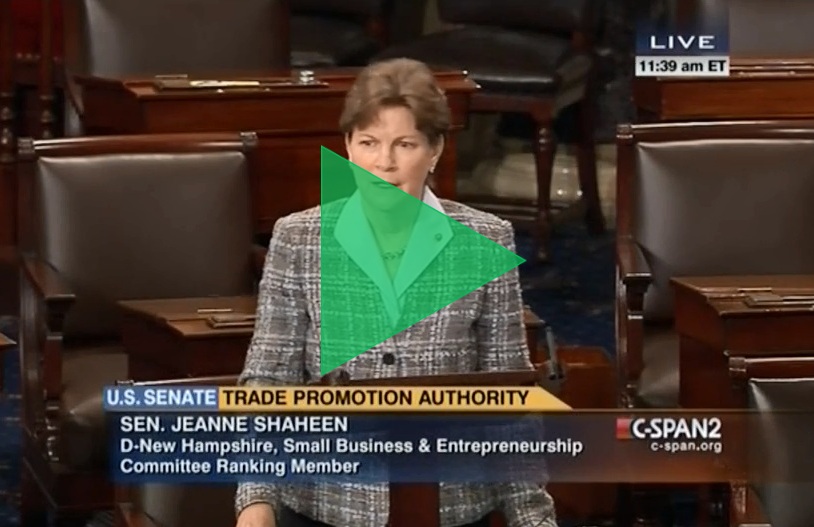ON SENATE FLOOR, SHAHEEN URGES ACTION ON HER AMENDMENTS TO TRADE BILL
(WASHINGTON, D.C.) – During floor debate today about the Trade Promotion Authority legislation currently under consideration by the U.S. Senate, Senator Jeanne Shaheen (D-N.H.) urged her colleagues to support two of her amendments to the legislation: the first, would boost small business exports and make sure that trade agreements work for small businesses, and the second, would eliminate a wasteful and duplicative government program on catfish regulation.
Video of her remarks are available here.
More information on the Shaheen amendment to help Small Businesses trade in the international marketplace:
Senator Shaheen’s amendment takes a number of steps to help small businesses take advantage of trade, such as reauthorizing the State Trade and Export Promotion (STEP) grant program through 2020 and increasing funding for the program by $5 million per year. The STEP program, which Shaheen helped create, is an export initiative that has successfully helped small businesses to enter the international marketplace and create jobs.
One company that has benefitted from the program is Corfin Industries of Salem, New Hampshire. Before STEP was implemented, its international sales were just 2%. Now, that number is up to 12%, and as a result the company has added 22 employees.
The appropriations bill that funded the government for the 2015 fiscal year reauthorized and funded the program. The Shaheen amendment would reauthorize the program through 2020. The STEP program has supported more than $900 million in U.S. small business exports, producing a return-on-investment of 15 to1 for taxpayers.
Shaheen’s amendment, in addition to reauthorizing the STEP program, would require an assessment by the Small Business Administration on the impact of a potential trade agreement on U.S. small businesses.
More information on the Shaheen amendment to eliminate a wasteful and harmful catfish inspection program:
The Shaheen amendment would repeal a new program tasked with inspecting and grading catfish that places jurisdiction for catfish inspection with the U.S. Department of Agriculture (USDA), while leaving regulation of all other seafood with the Food and Drug Administration (FDA).
During a hearing in the Small Business Committee earlier this month, Senator Shaheen highlighted the impact creating a duplicative and wasteful catfish inspection program at the USDA would have on High Liner Foods, a seafood company with operations based in Portsmouth, New Hampshire that employs more than 300 Granite Staters. As a seafood processor, High Liner currently deals with inspections from the FDA. The impending creation of a new inspection program just for catfish is preventing the company from expanding its offerings and operations, as the costs of complying with two different inspection regimes is prohibitive. A letter from High Liner is available here.
USDA has warned that the program may cost as much as $15 million a year to operate and has already cost $20 million without having inspected a single catfish. The U.S. Government Accountability Office, which evaluates risk for wasteful spending, has recommended eliminating the program in nine separate reports, calling it “duplicative” and “high-risk” for waste, fraud, and abuse.
Senator Shaheen wrote an op-ed “End the Catfish-Inspection Boondoggle,” that was published in Roll Call newspaper earlier this month.
